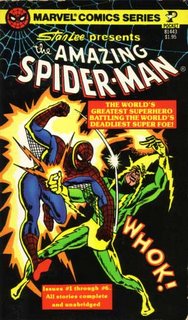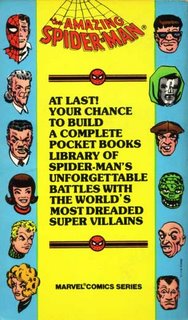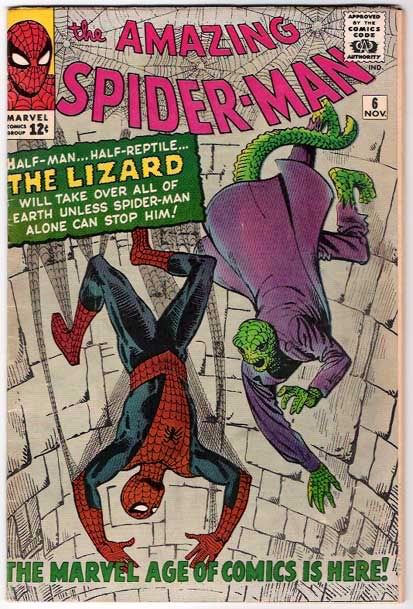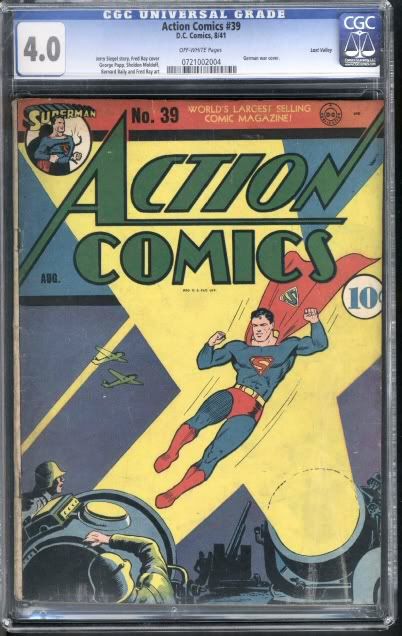Here's a neat site. You'll have to deal with the annoying Angelfire popups, but it's worth the hassle.
Treasury Comics: Oversized Comics Checklist with Scans
Musings about autographs, comic books and other neat stuff.
Pages
▼
Monday, June 19, 2006
Thursday, June 15, 2006
Superman Returns... WOW!
It's kind of spooky hearing the voice of the late Marlon Brando speaking as Jor-El, Superman's dead father.
Here is the 2:33 international trailer...
Here is the 2:33 international trailer...
Ghost Rider Trailer
Ghost Rider and the effects look pretty decent, but it is scheduled for February release.
Never a good sign.
Never a good sign.
Sunday, June 11, 2006
It's The Pocket Comics' Fault
 Way back in the day long before Masterworks reprints, trade paperbacks and the like, there were few ways a 9 year old Zipper could read Amazing Fantasy 15 and the first six issues of The Amazing Spider-Man.
Way back in the day long before Masterworks reprints, trade paperbacks and the like, there were few ways a 9 year old Zipper could read Amazing Fantasy 15 and the first six issues of The Amazing Spider-Man.Enter, the paperback-sized Pocket Comics by Pocket Books.
Each $1.95 issue contained exact reprints of the six issues of the glorious beginnings of Spider-Man, The Fantastic Four, Captain America and others.
I read these treasures over and over and over again until the spines cracked and the pages fell out. I practically memorized the first appearances of The FF, Spider-Man, Doctor Doom, Submariner and the Sandman to name a few.
The seeds of the obsession from which I suffer today were sown in 1977 when my eager hands clutched the first Pocket Comics.
At the time, the books reprinted in these volumes seemed like an impossibility... treasures that I would certainly never be able to afford. My God, at the time, the first issue of Fantastic Four probably would have cost more than $100. An incomprehensible sum to someone whose allowance was probably 50 cents a week.
 Here we are, almost 30 years later, and I have every issue ever printed of the Fantastic Four. I liked Spider-Man, but for whatever reason, the FF resonated more with me and that's the series I slowly collected, issue by issue.
Here we are, almost 30 years later, and I have every issue ever printed of the Fantastic Four. I liked Spider-Man, but for whatever reason, the FF resonated more with me and that's the series I slowly collected, issue by issue.By the time I finished my Fantastic Four run, Spider-Man was the most popular comic on the planet and collecting the run -- in any sort of decent condition -- wasn't financially realistic.
(Of course, with my completionist nature, the notion of collecting only **some** issues never entered my mind.)
But, I have adapted my collecting and decided that if I couldn't have every issue of Spider-Man, I could get a few that I really wanted.
Of issues 1- 6, issue number 6 was always my favorite read... and I've always had an itch to have a decent copy of this issue.
The cover trumpets, Half-Man, Half-Reptile... The Lizard Will Take Over All Of The Earth Unless Spider-Man Alone Can Stop Him! And, The Marvel Age Of Comics Is Here!
How exciting it must have been to pick up one of these fresh off a news stand in 1963!
Well, recently I finally picked up my copy. Forty three years after it was on a newsstand and 29 years after I first read my Pocket Comic which contained every wonderful page of Face-To-Face With The Lizard!
Tuesday, June 06, 2006
Showing Off, Again.
Ok, I've shared pics of this this book before, but they were digital pics taken at an angle. So, I finally got a scan of it on a legal sized scanner (Shhh... don't tell my employer what I was doing back in the graphic design department at lunch.)
The scan isn't as crisp and bright as the book actually appears... I sense the scanner is on its last leg.
As you've probably surmised, this is one of my favorites.
The scan isn't as crisp and bright as the book actually appears... I sense the scanner is on its last leg.
As you've probably surmised, this is one of my favorites.

